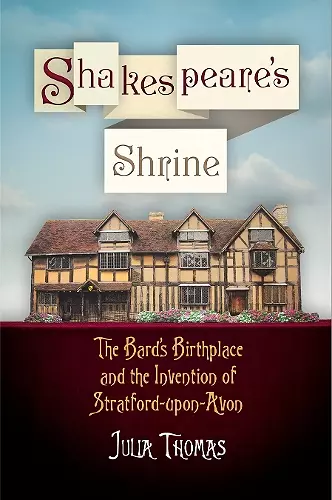Shakespeare's Shrine
The Bard's Birthplace and the Invention of Stratford-upon-Avon
Format:Paperback
Publisher:University of Pennsylvania Press
Published:8th Jan '15
Currently unavailable, and unfortunately no date known when it will be back

As the first major study of Shakespeare's Birthplace during the nineteenth century, Shakespeare's Shrine draws on extensive archival research to describe the invention of the Birthplace in the Victorian period, when the site was purchased for the nation, extensively restored, and transformed into a major tourist attraction.
Anyone who has paid the entry fee to visit Shakespeare's Birthplace on Henley Street in Stratford-upon-Avon—and there are some 700,000 a year who do so—might be forgiven for taking the authenticity of the building for granted. The house, as the official guidebooks state, was purchased by Shakespeare's father, John Shakespeare, in two stages in 1556 and 1575, and William was born and brought up there. The street itself might have changed through the centuries—it is now largely populated by gift and tea shops—but it is easy to imagine little Will playing in the garden of this ancient structure, sitting in the inglenook in the kitchen, or reaching up to turn the Gothic handles on the weathered doors.
In Shakespeare's Shrine Julia Thomas reveals just how fully the Birthplace that we visit today is a creation of the nineteenth century. Two hundred years after Shakespeare's death, the run-down house on Henley Street was home to a butcher shop and a pub. Saved from the threat of an ignominious sale to P. T. Barnum, it was purchased for the English nation in 1847 and given the picturesque half-timbered façade first seen in a fanciful 1769 engraving of the building. A perfect confluence of nationalism, nostalgia, and the easy access afforded by rail travel turned the house in which the Bard first drew breath into a major tourist attraction, one artifact in a sea of Shakespeare handkerchiefs, eggcups, and door-knockers.
It was clear to Victorians on pilgrimage to Stratford just who Shakespeare was, how he lived, and to whom he belonged, Thomas writes, and the answers were inseparable from Victorian notions of class, domesticity, and national identity. In Shakespeare's Shrine she has written a richly documented and witty account of how both the Bard and the Warwickshire market town of his birth were turned into enduring symbols of British heritage—and of just how closely contemporary visitors to Stratford are following in the footsteps of their Victorian predecessors.
"A substantive discussion of the purchase and renovation of Shakespeare's birthplace and how Victorian values (e.g., regarding authenticity) affected the restoration efforts." * Library Journal *
"Thomas is good company. . . . She has a nice sense of narrative development and pacing, and extracts drama and comedy from everything from guidebook conventions to local disputes. . . . A highly developed sense of irony is an asset in this field, and Thomas has it." * TLS *
"In Shakespeare's Shrine: The Bard's Birthplace and the Invention of Stratford-upon-Avon, Julia Thomas describes the origins, the fashioning and the influences of the house on Henley Street, and along the way, the often uneasy tension between a desire for archaeological and historical veracity and its frustration by more pressing commercial concerns. . . . A fascinating account of Stratfordian cultural tourism." * Times Higher Education *
"This book is not only a delight to read, owing to the affectionate irony that tinges its prose, but also deeply instructive. Without renouncing the pleasure of storytelling, Thomas is always alert to implications and ready to increase our consciousness of cultural phenomena. She simultaneously constructs and deconstructs the fascination of the Birthplace, luring us into sharing the believers' gaze only to show how this aura of mysticism was created." * Journal of British Studies *
ISBN: 9780812223378
Dimensions: unknown
Weight: unknown
232 pages